 Petzlover
Petzlover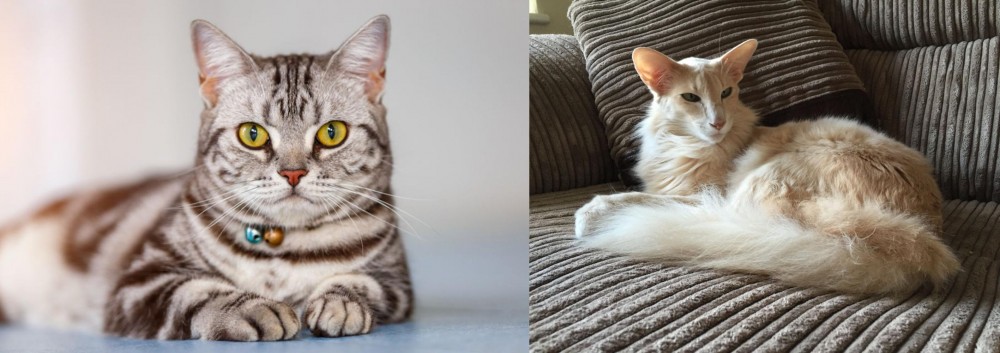 American Shorthair is originated from United States but Oriental Longhair is originated from United Kingdom. Both American Shorthair and Oriental Longhair are having almost same weight. American Shorthair may live 5 years more than Oriental Longhair. Both American Shorthair and Oriental Longhair has same litter size. American Shorthair requires Low Maintenance. But Oriental Longhair requires Moderate Maintenance
American Shorthair is originated from United States but Oriental Longhair is originated from United Kingdom. Both American Shorthair and Oriental Longhair are having almost same weight. American Shorthair may live 5 years more than Oriental Longhair. Both American Shorthair and Oriental Longhair has same litter size. American Shorthair requires Low Maintenance. But Oriental Longhair requires Moderate Maintenance
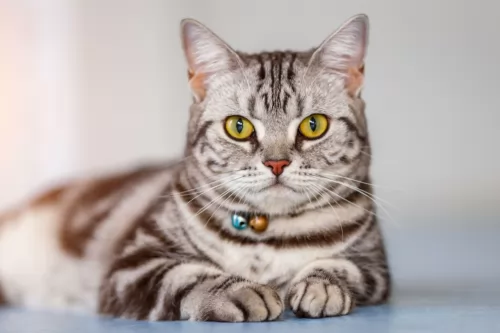 Often sailors of old would keep cats onboard to protect their stores from mice and rats, and so it was when settlers sailed from Europe to North America.
Often sailors of old would keep cats onboard to protect their stores from mice and rats, and so it was when settlers sailed from Europe to North America.
They had cats onboard and once onshore they interbred. But in the 20th century, a selective breeding program began to bring out the best qualities of these cats.
The American Shorthair is one of these cats – a pedigreed cat that is accepted by all North American cat registries. At first, the cat was known as the Domestic Shorthair but it was renamed in 1966.
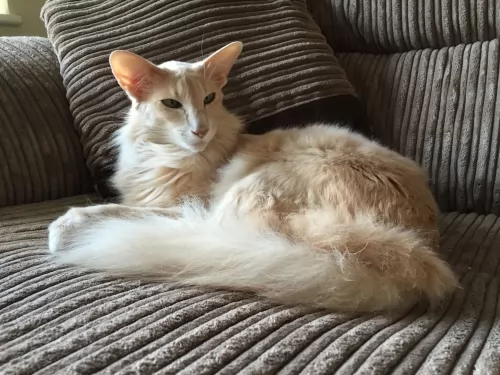 Your Oriental Longhair cat has his foundations in the Siamese breed. The Siamese came from Thailand to the UK in the 1800s.
Your Oriental Longhair cat has his foundations in the Siamese breed. The Siamese came from Thailand to the UK in the 1800s.
Sometimes a litter of Siamese kittens produced a long-haired variety but in the 1950s breeders started honing in on these longer haired Siamese cats.
Various crossings took place and Oriental Shorthairs came about. By breeding these Shorthairs with Balinese cats, the Oriental Longhair came about in the 1970s.
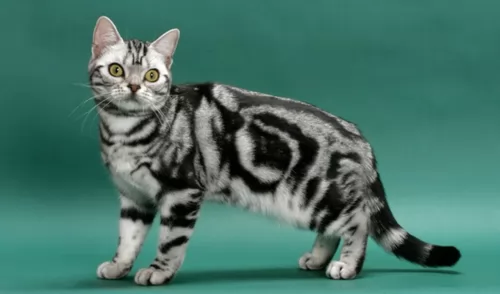 The American Shorthair is a large, sturdy cat with a round face and short ears. Their coats can come in many different patterns and colors. They shed so the fur will need to be brushed from time to time.
The American Shorthair is a large, sturdy cat with a round face and short ears. Their coats can come in many different patterns and colors. They shed so the fur will need to be brushed from time to time.
They stand at about 20 – 25cm in height and they weigh between 5 and 7kg.
The American Shorthairs are easy, no-fuss cats. They’re also low maintenance, healthy, amicable cats, ready to even be friends with strangers and your dogs.
He is an intelligent cat too so it will be important to provide him with toys that challenge him to think. These good-natured cats make perfect famiy companions.
 The Oriental Longhair is a medium-sized cat with a fairly long, muscular, lean body. The Oriental Longhair actually resembles the Siamese cat.
The Oriental Longhair is a medium-sized cat with a fairly long, muscular, lean body. The Oriental Longhair actually resembles the Siamese cat.
They also come in an outstanding array of colors and patterns with the coat being long and silky. The coat can be a solid color but you can also find tabby-type coats as well as tipped coats. The cat doesn’t have an undercoat and coat lies fairly flat against the body. You will also hear it being referred to as a semi-longhair.
The tail is attractive and forms quite a bushy plume.
The Oriental Longhair cat has almond-shaped green eyes. If you see the white Orientals, they can have green or blue eyes. They can also be odd-eyed.
These cats are intelligent, curious, and good-natured and they love to talk. Therefore it is important that such a cat breed have a home where there is plenty of company.
They’re active cats too, loving to play and bound and leap. He'll want to willingly join in with some of your games. The cat will certainly need some exciting toys to keep him occupied.
They are loyal cats and become loving and devoted to their human family, getting on well with children in the home as well as other pets.
They don’t like being left alone at all and will prefer to have company, even if it is from another pet.
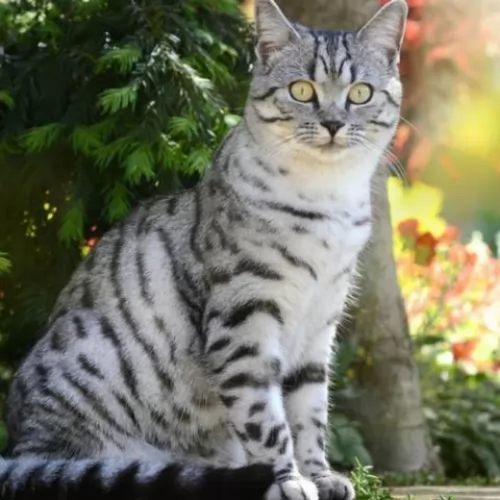 The American Shorthair is a playful cat and is quite capable of amusing himself, but will welcome your games too. He’s a big cat so make sure he gets enough exercise to avoid him becoming obese.
The American Shorthair is a playful cat and is quite capable of amusing himself, but will welcome your games too. He’s a big cat so make sure he gets enough exercise to avoid him becoming obese.
He is a low maintenance cat and you don't have to be worrying about him too much as he just likes to get on with life. He loves being well-fed, getting your attention and lying in the sun.
This is one cat that doesn’t need a lot of attention so being easy to care for, independent, playful, and affectionate, you’re going to have one of a kind companion and friend.
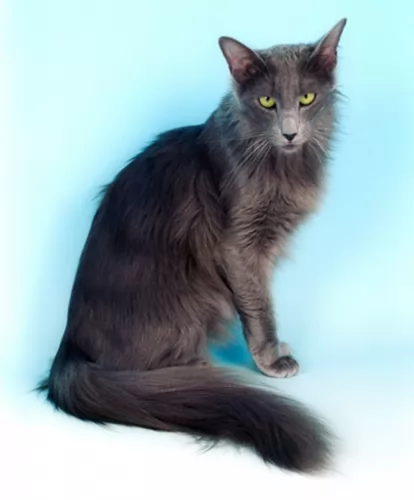 Your Oriental Longhair is such a friendly, lively cat and he makes a splendid companion. It is an inquisitive cat and likes to be part of the activity in the household.
Your Oriental Longhair is such a friendly, lively cat and he makes a splendid companion. It is an inquisitive cat and likes to be part of the activity in the household.
He is a social, talkative cat and has always got a lot to say/ They love the attention of their human family and don’t like being separated too long from them.
When you get one of these cats, you get both an entertainer and a friend.
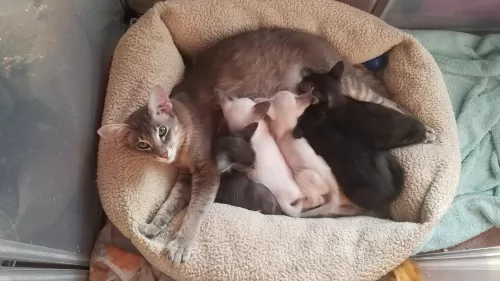 The Oriental Longhair is generally considered a healthy breed. Because the cat can be prone to some inherited conditions, it is always a wise move to buy a kitten from a reputable breeder.
The Oriental Longhair is generally considered a healthy breed. Because the cat can be prone to some inherited conditions, it is always a wise move to buy a kitten from a reputable breeder.
A couple of these diseases to look out for include Progressive Retinol Atrophy which is a degenerative condition that can lead to blindness.
Also, look out for periodontal disease which is common in many cat breeds.
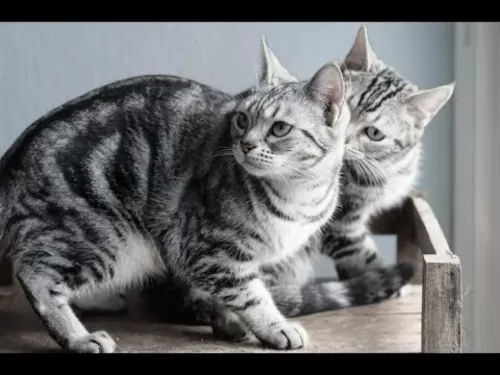 Your American Shorthair will benefit greatly from regular brushing and he looks forward to this grooming period and being pampered by you for a few minutes.
Your American Shorthair will benefit greatly from regular brushing and he looks forward to this grooming period and being pampered by you for a few minutes.
It helps to remove the dead hair from his coat and this is important so that he doesn’t ingest the loose hair. While you’re brushing him, you can also run your fingers over him to make sure there are no unusual lumps. Anything odd or any sign of illness you should take your cat to see the vet immediately.
Make sure your American Shorthair has access to the best quality food there is. There are many commercially manufactured cat foods available and your vet can advise you on the best one to choose.
Cats are carnivores so aways choose food that is high in proten. Food must be provided in accordance with the cat’s age and energy levels. Certainly a generic cat or one with a medical condition will need a certain type of food than a young, frisky kitten. Make sure your cat always has access to fresh, cool water.
Make sure your furry feline friend has everything he needs to ensure he is comfortable. This includes feeding bowls, toys, a litter box, soft bedding, nutritious food as well as scratching post and climbing equipment.
Have your pet neutered or spayed if you don’t want kittens from your cat. These procedures have enormous health benefits for your pet and it prevents even more kittens coming into a world that already has far too many unwanted pets.
Make sure your cat is up to date with all his vaccines because without being vaccinated your cat can succumb to any one of the life-threatening cat illnesses there are. Kittens need to have their first vaccines at 8 weeks of age.
If you have to take your cat to the vet you need a carrier basket so that your cat feels comfortable and safe inside it.
You can’t just put your cat on a leash and take him to the vet as inside the car he will lurch around and cause you to lose attention. A transport box that is familiar to your cat will be the best way for you and your cat to travel.
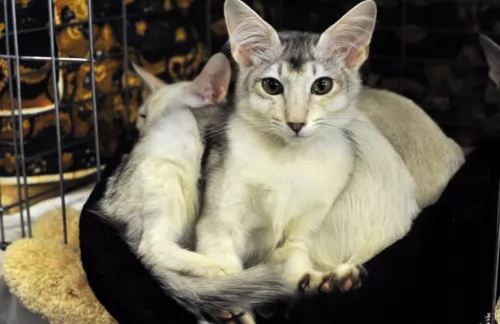 This is a slim cat and you can easily tell when he has put on weight. Be very careful with how much you feed your cat and what you feed him.
This is a slim cat and you can easily tell when he has put on weight. Be very careful with how much you feed your cat and what you feed him.
Cats are carnivores and you need to ensure that his diet is rich in meaty ingredients. These cats have long slim legs and extra weight can put pressure on the cat’s joints. Keep your cat lean and healthy. If in any doubt about diet for your cat, speak to your vet, Always ensure a bowl of fresh, cool water.
Prepare to have a cat included in your family. Invest in food and water bowls, a cat bed, grooming brushes, toys, climbing tree, scratching post and litter box. A cat box for transporting your pet to the vet is also a good idea.
The Oriental Longhair loves to leap up into high areas so he will need a climbing tree. Try to get your cat out into the sunshine where possible and allow him to climb into a tree.
The cat’s medium- to long hair will require brushing once or twice a week. When you brush your pet gently but purposefully, he loves it and it becomes a bonding session.
Provide your cat with a litterbox and make sure to clean out the box every day. You can do that by buying a small plastic rake at the pet shop and it keeps the litter nice and even for your pet.
Have your cat neutered or spayed to prevent unwanted kittens.